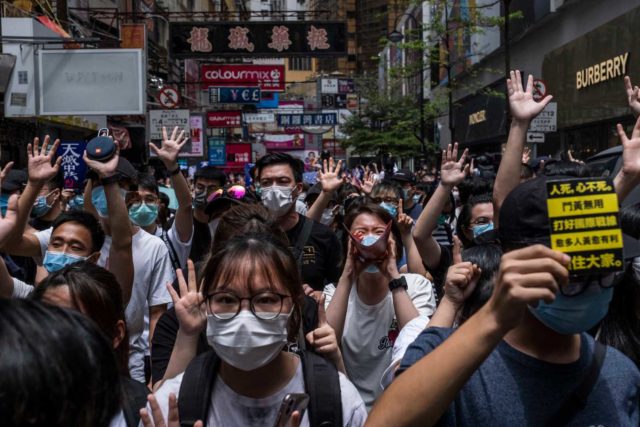Americans blame China for the COVID-19 pandemic. Whether the virus was manufactured in a lab, was part of a bio-weapons program, derived from the “wet markets,” or something else, it is clear that Chinese government activity and deliberate obfuscation, arrests of scientists and deletion of crucial information has cost the world millions of lives impacted and countless economies damaged.
China has, as yet, paid no price. And that, inevitably, emboldens tyrannical regimes in their pursuit of dictatorial rule at home and abroad. It was true of the Soviet Union, and it is true of China.
Xi Jinping, China’s despot, has taken advantage of the necessary inward turn of Western national governments to increase China’s hold on Hong Kong, passing the “Security Law” that, in violation of the terms of the end of Britain’s lease on the island colony, puts Beijing in direct control. Early reports indicate that four activities are criminalized: secession, subversion, terrorism and collusion with foreign or external forces.
Those words should be inside quotation marks because all are subject to very wide interpretation. Communist legal interpretations, in particular, differ greatly from those of free societies. In this case, they will be interpreted by a nominally Hong Kong-led national security commission, with a Beijing-appointed advisor. Beijing will have the power to extradite people to the mainland for adjudication of the above national security crimes. It appears that “violators” (protesters) of the law can receive life in prison; the minimum term is 10 years.
In May, when it appeared that the law would pass, the Trump administration said it would no longer consider Hong Kong to be separate from China—thus ending the special economic, customs and travel status of which China has taken advantage. Taiwan, the United Kingdom and Canada announced that they would permit up to millions of people to come to their countries, if necessary.
In other words, despite the financial aggravation to be imposed on China, as well as an escape route, Taiwan and the West were prepared to fold their tents on Hong Kong.
Hong Kongers have been out in the streets for months, demonstrating for their rights and freedoms. Throughout the COVID-19 pandemic, hundreds of thousands, and sometimes more than one million, of Hong Kong’s 7.5 million residents repeatedly protested the erasure of their “one country, two systems” arrangement. Despite the ban on Tiananmen Square memorial demonstrations, tens of thousands of Hong Kongers were out. “They will not go gently into the night” of President Xi Jinping’s brutal dictatorship, journalist Claudia Rosett told hundreds of participants on a Jewish Policy Center conference call in mid-June.
And, she added, “Hong Kong might thereby inspire mainland Chinese.”
One would certainly hope so.
But how to make China pay? There is simply no expectation—nor should there be—that the U.S. will go to war with China over Hong Kong. Or Taiwan. But that doesn’t mean we have no leverage.
An interesting bipartisan group of senators has introduced the “American Foundries Act of 2020” to boost the American semiconductor industry. Republicans Jim Risch, Tom Cotton, Josh Hawley, and Susan Collins were joined by Democrats Chuck Schumer, Jack Reed, Kirsten Gillibrand, and Doug Jones, plus Independent Angus King, in drafting a measure that would award $15 billion in grants to states to assist in “construction, expansion or modernization” of semiconductor plants and facilities. Some of the money will be for R&D and some for production, dispensed through the Departments of Defense, Commerce and Energy, as well as the National Institute of Standards and Technology. Private sector companies can receive government money, but none can receive funds that are “under the foreign ownership, control or influence” of the Chinese regime or other foreign adversaries.
The U.S. still leads in the development and production of semiconductors, followed by South Korea, Japan, the EU and Taiwan—with China coming up fast, in part by acquiring Western companies and taking back home the underlying intellectual property. The Trump administration vetoed the sales of two China-related chip makers in 2018, and this effort will codify the rules and help to keep China from surging ahead.
The terror that is sweeping the pro-democracy demonstrators in Hong Kong at the likelihood that Beijing will find them and deport them to the mainland under phony charges of “terrorism” or “subversion” is well-founded. The United States, Europe and our Asian allies have an obligation now to show China that we are paying attention, and that Xi Jinping’s intention to rule unfettered will be met by a determination to keep the regime from buying and stealing technology to feed its machine.
During the Cold War, the U.S. and its allies choked the uncompetitive Soviet Union. We can do it again—and should. What’s more, we can also provide hope to those who believe that the West has abandoned them.






